Roofing Companies Norton
Best Roofers in Norton
Get multiple Roofing Services quotes for your project today! Compare profiles, reviews, accreditations, portfolio, etc... and choose the best deal.

Enhance roofing and building
4.627 reviewsSunderland, GB- Services
- Why Us?
- Gallery
Get Quote
Bralton Roofing
511 reviews12 Harris Avenue, Rumney, CF3 1QE, GBAt Bralton Roofing, we are a multi-disciplinary residential roofing contractor serving Cardiff and South Wales. We specialize in traditional pitched slate and tiled roofs, offering individually tailored roof installation and repair services. Our team of experts provides a comprehensive range of services, including roof window installation, roof ventilation installation, roof waterproofing, roof structure repair, gutter installation, chimney services, and roof design. We pride ourselves on delivering high-quality workmanship, using certified and quality roofing materials, and ensuring labour quality assurance according to BS5534. We are committed to providing a hassle-free and stress-free experience for our customers, with a focus on clear communication, effective material and labour management, and a collaborative planning process. We believe in delivering excellence in everything we do, and our team is dedicated to exceeding your expectations.
- Services
- Why Us?
- Gallery
Get Quote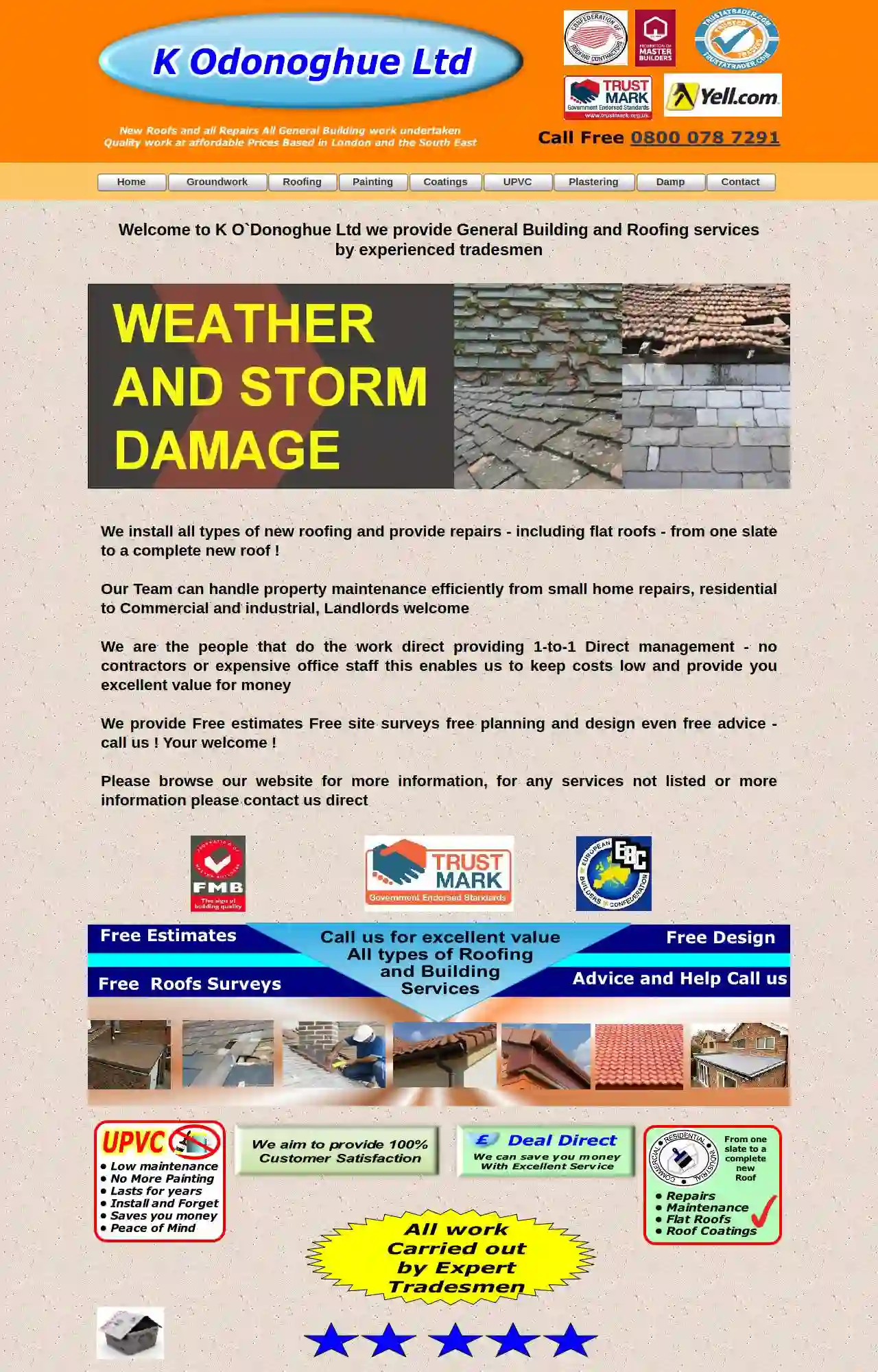
K O'Donoghue Ltd
51 reviewsGBWelcome to K O`Donoghue Ltd we provide General Building and Roofing services by experienced tradesmen. We install all types of new roofing and provide repairs - including flat roofs - from one slate to a complete new roof ! Our Team can handle property maintenance efficiently from small home repairs, residential to Commercial and industrial, Landlords welcome. We are the people that do the work direct providing 1-to-1 Direct management - no contractors or expensive office staff this enables us to keep costs low and provide you excellent value for money. We provide Free estimates Free site surveys free planning and design even free advice - call us ! Your welcome ! Please browse our website for more information, for any services not listed or more information please contact us direct.
- Services
- Why Us?
- Gallery
Get Quote
LA Roofers
4.445 reviews22 Oliver Street, Linthorpe, Middlesbrough, TS5 6JH, GBLA Roofers (LA Roofers) have been in the business of domestic roofing for over half a century. Being based in central Middlesbrough we are well placed to serve all areas in and around the town, County Durham and the wider area. Our family-run business has been built on a mixture of communication and transparency topped with great pride in our customer support. It’s our aim to exceed your expectations at every level. All our roofing services come with a full guarantee. Whether you’re looking for a complete roofing overhaul or require maintenance, give the team of experts at LA Roofers a call today. We have a wealth of experience, which has enabled us to grow into the highly professional company we are today, without losing our traditional core values for a high standard of service with total customer satisfaction. Roofing Work Undertaken Throughout Middlesbrough Fibreglass GRP Roofing in Middlesbrough provides a strong, durable and long lasting solution to commercial & industrial roofs. Whether its factory, warehouse, showroom or office, your roof is vital to the day to day running of your business. Leaks, damage, age and deterioration can all unexpectedly disrupt your business at any time. Therefore it is vital that your roof is maintained and built to industry standards to ensure the protection of your business and goods. If you are looking for a Fibreglass Roof in Middlesbrough, LA Roofers provide a wide range of roofing services to commercial & industrial businesses as well as domestic & residential customers throughout the North East of England. From repairs & general services to complete rebuilds of all types, our GRP roofing services in Middlesbrough offer ex
- Services
- Why Us?
- Gallery
Get Quote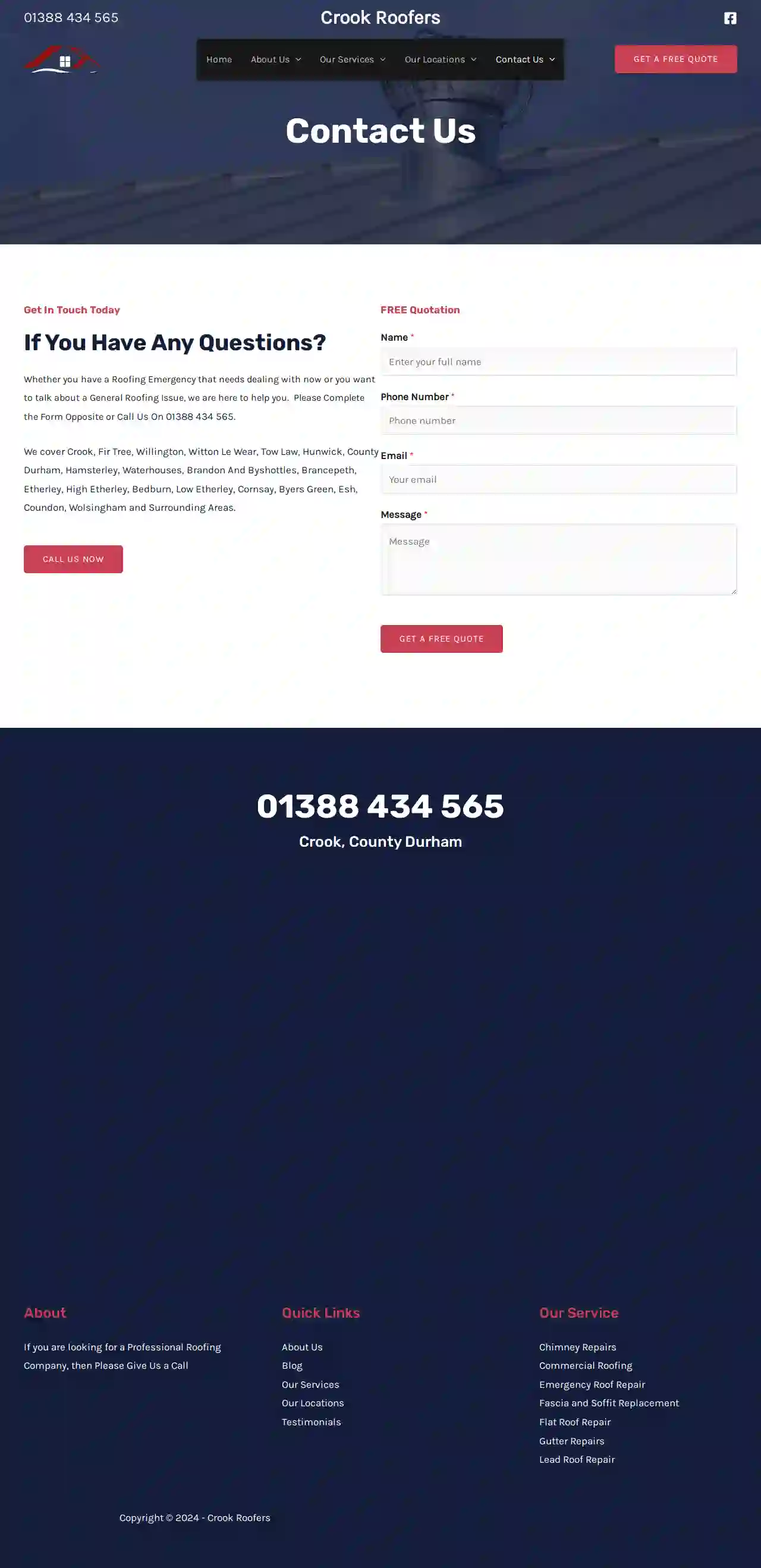
Crook Roofers
59 reviewsCrook, DL15, GBCrook Roofers is a professional roofing company with over 20 years of experience delivering high-quality workmanship and personal service. We are available 7 days a week and offer a range of roofing services, including flat roof repairs, flat roof construction, replacing damaged roof tiles, leaking roofs, re-pointing mortar, gutter repairs, chimney repairs, and asbestos removal. We cover Crook, Fir Tree, Willington, Witton Le Wear, Tow Law, Hunwick, County Durham, Hamsterley, Waterhouses, Brandon, and surrounding areas. Our team is experienced, trained, and specialist in roofing, and we strive for 100% customer satisfaction. We provide free quotes, no call-out charge, and complete roof renewals are fully guaranteed.
- Services
- Why Us?
- Testimonials
- Gallery
Get Quote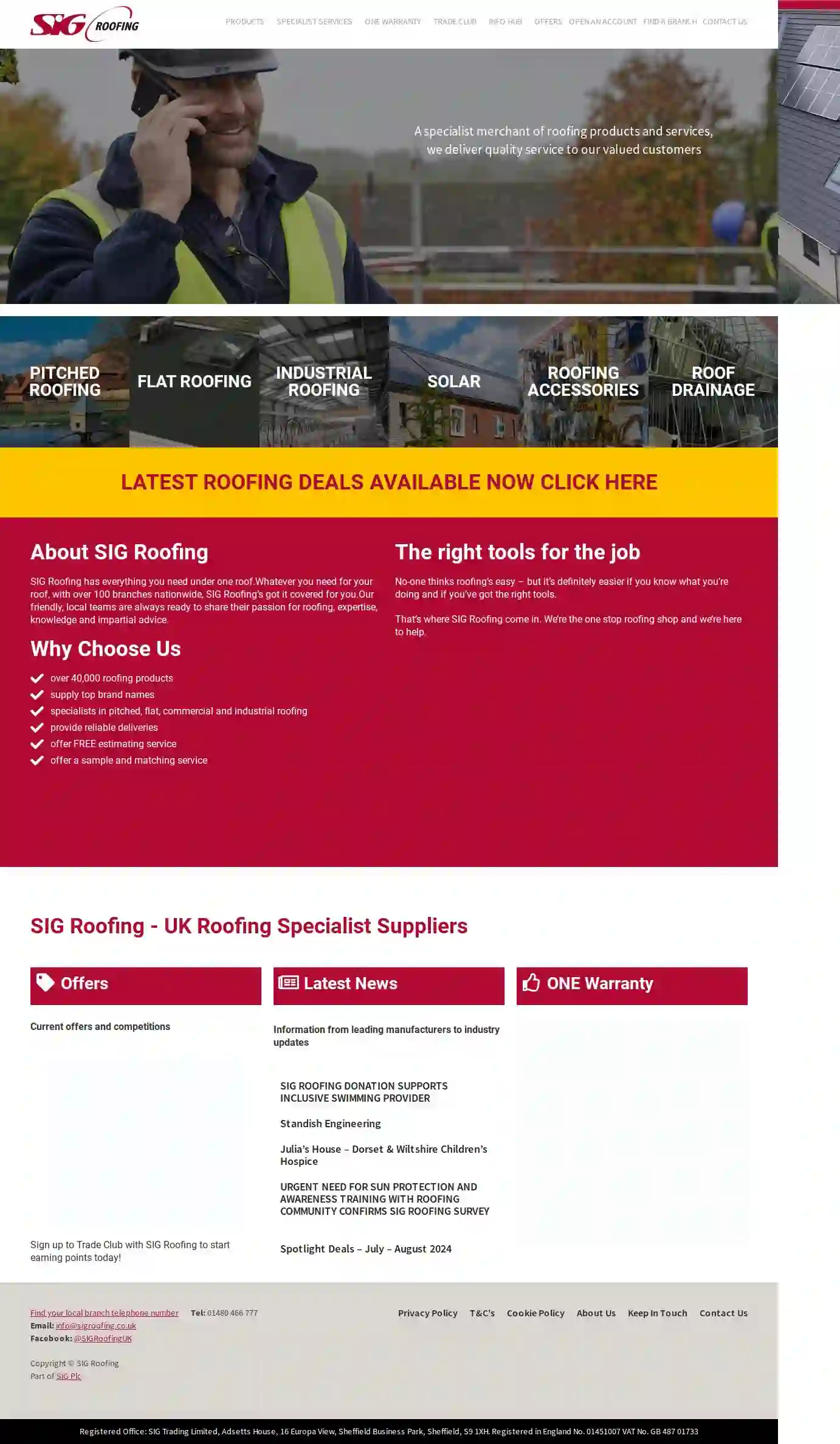
SIG Roofing Middlesbrough
4.532 reviewsMiddlesbrough, GBSIG Roofing is a specialist merchant of roofing products and services, delivering quality service to our valued customers. Established for over 40 years – with branches throughout the UK from Inverness to Plymouth. We have everything you need under one roof. Whatever you need for your roof, with over 100 branches nationwide, SIG Roofing’s got it covered for you. Our friendly, local teams are always ready to share their passion for roofing, expertise, knowledge and impartial advice.
- Services
- Why Us?
- Gallery
Get Quote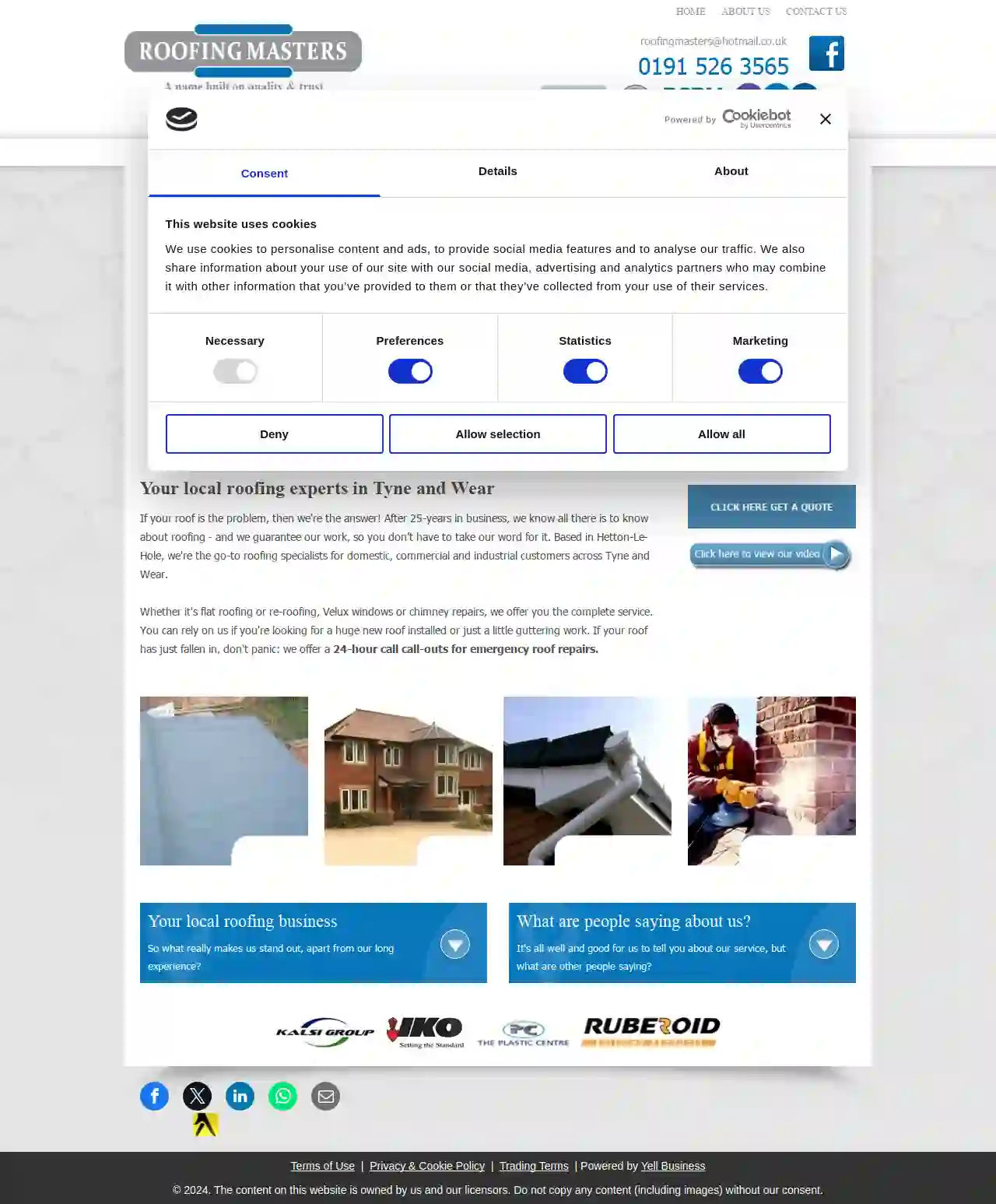
Roofing Masters
4.9117 reviewsSummerville, 4 Heather Drive, Hetton-le-Hole, DH5 9RS, GBRoofing Masters is a family-run business with over 25 years of experience in providing high-quality roofing services to domestic, commercial, and industrial customers across Tyne and Wear. We pride ourselves on our commitment to quality, reliability, and customer satisfaction. Our team of experienced and skilled operatives are fully trained in Health & Safety and carry CSCS cards. We offer a range of services including flat roofing, re-roofing, fascias and soffits, guttering, and asbestos removal. We also provide 24-hour emergency call-outs for emergency roof repairs. Our customers can rely on us for a prompt and professional service, and we guarantee our work to ensure complete peace of mind.
- Services
- Why Us?
- Accreditations
- Our Team
- Testimonials
- Gallery
Get Quote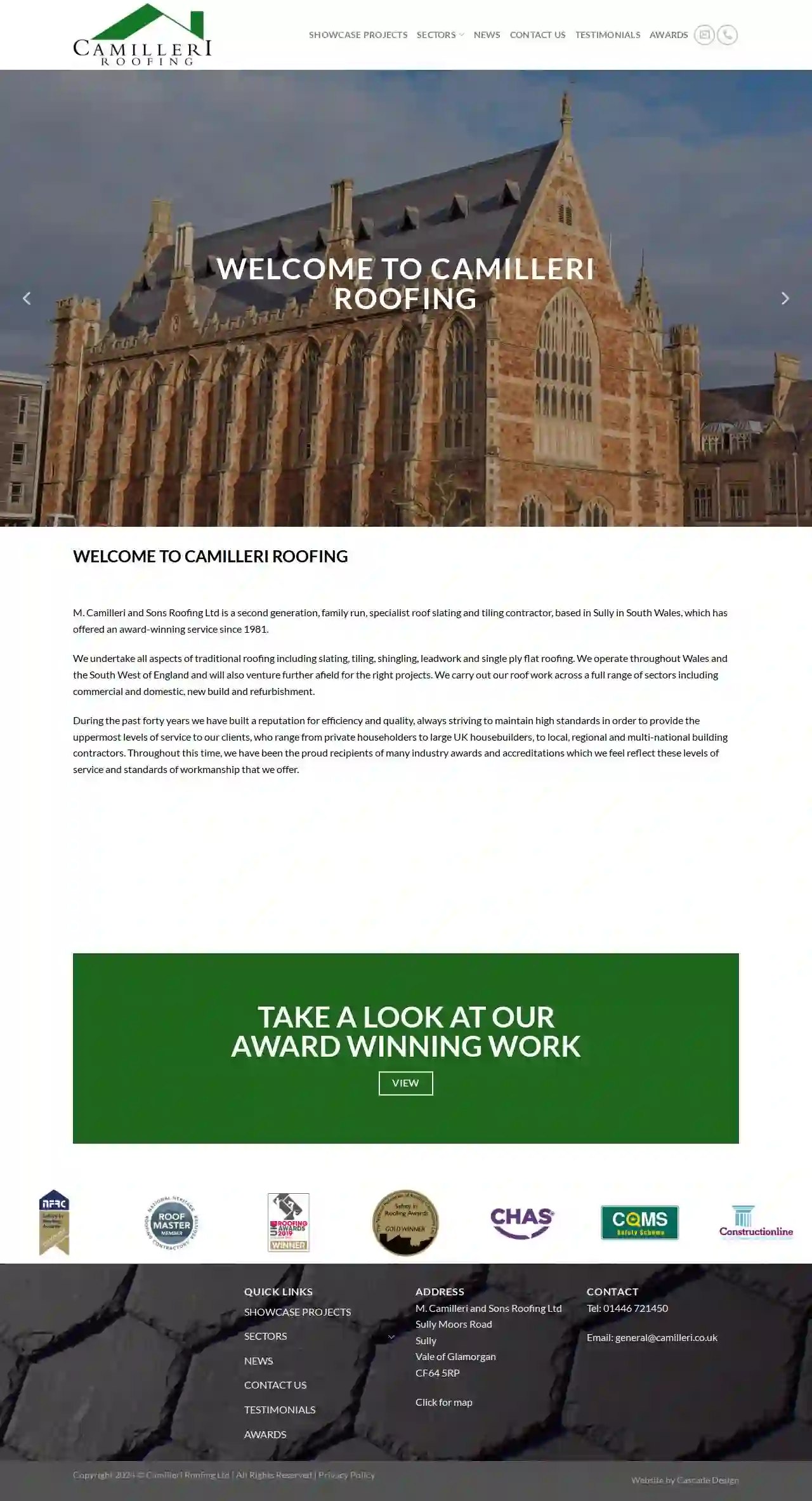
Camilleri Roofing
4.98 reviewsSully Moors Road, Sully, CF64 5RP, GBM. Camilleri and Sons Roofing Ltd is a second generation, family run, specialist roof slating and tiling contractor, based in Sully in South Wales. We have offered an award-winning service since 1981. We undertake all aspects of traditional roofing including slating, tiling, shingling, leadwork and single ply flat roofing. We operate throughout Wales and the South West of England and will also venture further afield for the right projects. We carry out our roof work across a full range of sectors including commercial and domestic, new build and refurbishment. During the past forty years we have built a reputation for efficiency and quality, always striving to maintain high standards in order to provide the uppermost levels of service to our clients, who range from private householders to large UK housebuilders, to local, regional and multi-national building contractors. Throughout this time, we have been the proud recipients of many industry awards and accreditations which we feel reflect these levels of service and standards of workmanship that we offer.
- Services
- Why Us?
- Accreditations
- Our Team
- Testimonials
- Gallery
Get Quote
I R & D Ferguson Roofing
52 reviews49 Collin Ave, Middlesbrough, TS4 3HH, GBWe are a local family-run business that has specialised in the roofing industry for over 30 years. We aim to provide the best possible service for repair and installation work throughout the North East of England. With our high expertise and knowledge in the area our fully trained team can get your roof done right, just the way you want it! Save money on your heating and energy bills in future by getting your roof built the right way by us. At I.R.&D Ferguson Roofing & Rooflines, we have many services for your needs. If you're looking for a roofer Middlesbrough we provide roofing services throughout the North East and we aim to provide the best possible service for repair and installation work.
- Services
- Why Us?
- Accreditations
- Our Team
- Testimonials
- Gallery
Get Quote
F J Lowery & Son
51 reviews38 Ashgrove, Cardiff, CF14 1BG, GBF.J Lowery & Son Roofing is a family-run business based in Cardiff, with over 40 years of experience in the roofing industry. We are City & Guilds trained and pride ourselves on providing high-quality roofing services to both domestic and commercial clients. We have worked on many notable buildings in Cardiff, including Cardiff City Hall, Cardiff Castle, and the New Theatre, as well as maintaining all schools and council housing in the city. Our team is fully trained in Asbestos Awareness and Working at Heights, and all staff have been DBS checked. We offer a complete range of roofing services, including tiling and slating, flat roofing, built-up felt roofing, and mastic asphalt roofing. We are committed to providing our clients with the best possible service and workmanship, and we always strive to exceed their expectations.
- Services
- Why Us?
- Gallery
Get Quote
Over 12,314+ Roofers on our platform
Our roofing contractors operate in Norton and surroundings!
Roofyng.co.uk has curated and vetted Top Roofing Companies in and around Norton. Find the most trustworthy contractor today.
Frequently Asked Questions About Roofing Companies
- Experience: 'How long have you been in business, and what experience do you have with my type of roof?'
- Licensing and insurance: 'Are you licensed and insured, and can I see proof of coverage?'
- Warranties: 'What warranties do you offer on your work and the materials used?'
- References: 'Can you provide references from past clients?'
- Project Timeline: 'What is the estimated timeline for completing the project?'
- Payment Terms: 'What are your payment terms, and do you require a deposit?'
- Communication: 'How will you keep me updated on the project's progress?'
- Cleanup: 'What steps will you take to protect my property during the project and ensure proper cleanup afterward?'
- Home Improvement Loans: Offered by banks or credit unions.
- Home Equity Loans or Lines of Credit: Use your home's equity as collateral.
- Government Programs: Check for energy efficiency rebates or grants.
- Contractor Financing: Some roofing companies offer financing plans.
What questions should I ask a roofing contractor?
How can I get financing for a new roof?
What is the difference between a roofer and a general contractor?
Roofer: Specializes in roof installations, repairs, and replacements. They have expertise in roofing materials, techniques, and safety practices specific to roofing.
General Contractor: Oversees and manages entire construction projects, including hiring and coordinating subcontractors, such as roofers, electricians, plumbers, etc. They handle overall project planning, scheduling, and budgeting.
For roofing projects, it's generally best to hire a roofing contractor who specializes in roof work.
What is fascia, and why is it important?
What questions should I ask a roofing contractor?
- Experience: 'How long have you been in business, and what experience do you have with similar projects?'
- Licensing and insurance: 'Are you licensed and insured, and can I see proof of coverage?'
- Warranties: 'What warranties do you offer on your work and the materials used?'
- References: 'Can you provide references from past clients?'
- Project Timeline: 'What is the estimated timeline for completing the project?'
- Payment Terms: 'What are your payment terms, and do you require a deposit?'
- Communication: 'How will you keep me updated on the project's progress?'
- Cleanup: 'What steps will you take to protect my property during the project and ensure proper cleanup afterward?'
How can I get financing for a new roof?
- Home Improvement Loans: Offered by banks or credit unions.
- Home Equity Loans or Lines of Credit: Use your home's equity as collateral.
- Government Programs: Check for energy efficiency rebates or grants.
- Contractor Financing: Some roofing companies offer financing plans.
What is the difference between a roofer and a general contractor?
Roofer: Specializes in roof installations, repairs, and replacements. They have expertise in roofing materials, techniques, and safety practices specific to roofing.
General Contractor: Oversees and manages entire construction projects, including hiring and coordinating subcontractors, such as roofers, electricians, plumbers, etc. They handle overall project planning, scheduling, and budgeting.
For roofing projects, it's generally best to hire a roofing contractor who specializes in roof work.